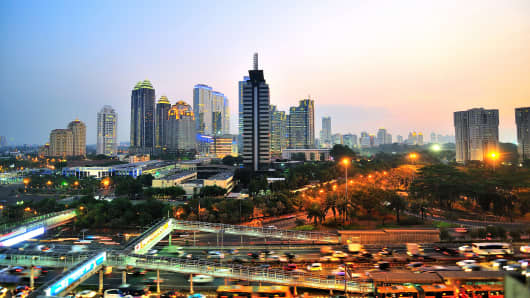Most weekends, the Grand Clarion hotel, which looms over central Makassar, is fully booked for wedding parties, with organizers often flown in from Indonesia's capital, Jakarta, and parents paying Rp250 million — Rp400 million ($26,000-$42,000) to entertain about 1,000 guests at a time.
"We are the favorite place in Makassar for weddings, conferences and other events and we need to expand to keep up with demand," says Anggiat Sinaga, general manager of the 333-room hotel, which is adding more than 250 rooms and a new convention center that can seat up to 5,000.
From weddings to funerals and iPhones to cars, emerging middle-class consumers in Makassar and Indonesia's other booming second-tier cities are increasing their spending, and investors are stepping up their efforts to exploit these fast-growing and relatively untapped markets.
Makassar is one of a dozen or more Indonesian cities where economic growth is outpacing Jakarta and the rest of the island of Java, the country's political, economic and cultural heart.
Although Java attracted more than half of the Rp 148,000 billion of investment in the first half of the year, foreign and local investors are increasingly looking to diversify, echoing a shift to second-tier cities that has been seen in other major emerging markets like Brazil, China and India.
The port city of Makassar, on the "k"-shaped island of Sulawesi, around 800 miles east of Jakarta, has long been a bustling entrepot thanks to the seafaring traditions of its Buginese inhabitants, who built historical trade networks throughout the 17,000-island archipelago that has become modern Indonesia.
But in recent years, growth in Makassar has taken off, thanks to surging consumer demand and a commodities boom – the twin pillars of the wider Indonesian growth story – which has seen southeast Asia's biggest economy grow at an average rate of nearly 6 per cent in the last five years.
"Makassar is a strategically located hub for eastern Indonesia, which is under-developed in terms of infrastructure and investment but is turning around now," says Erwin Aksa, president director of Bosowa, one of two connected family conglomerates that dominate the city.
More than 32m Indonesians are expected to move from the countryside to the cities in the next two decades, increasing the urban population from 53 per cent to 71 per cent of the total, according to McKinsey, the management consulting group.
"There will big opportunities for investors looking to reach consumers outside Java that are able to tailor their goods and services to local tastes," says Raoul Oberman, chairman of McKinsey's Indonesia business.
Bosowa, which Mr Aksa's father founded as a small local trading company in 1973, now owns car dealerships, hospitals and toll roads in Makassar and is investing $1 billion this year in new power plants, a nickel smelter, a Novotel hotel and other projects.
Kalla Group, owned by Jusuf Kalla, a former vice-president of Indonesia and potential future presidential candidate, related by marriage to the Aksas, is also increasing its investments in Makassar with a similar focus on power generation, smelting facilities for Sulawesi's sizeable nickel reserves and infrastructure, with a feasibility study under way on the construction of what could be Indonesia's first monorail system.
"If you compare Makassar with other cities in Indonesia, the majority of investment is by local Sulawesi businessmen," he says.
But that is changing. Large family-owned conglomerates like Sinar Mas, Ciputra and the Lippo Group are increasingly looking outside Java to tap into middle-class demand for good quality housing and shopping in second-tier cities like Makassar, Pekanbaru in Sumatra and Balikpapan in Borneo – all of which are posting annual GDP growth of around 9 per cent.
"The middle class is rising quickly," says Theo Sambuaga, a senior executive at Lippo. "The big opportunity now is outside of Java, particularly in eastern Indonesia."
In Makassar, Lippo has recently opened a 400-bed private hospital and is building a 1,500 hectare beachside development with retail centers and gated housing estates.
To tap the higher end of the market, Chairul Tanjung, who owns banking, property and media businesses, teamed up with Mr Kalla to build TransStudio, one of southeast Asia's largest indoor theme parks, adjoining the only luxury shopping mall in eastern Indonesia.
Their target market is the local middle class and affluent visitors from eastern Indonesia who come for conferences and events or en route by air to Singapore, Jakarta and the rest of western Indonesia.
For travelers from Papua, 2,000km to the east, the TransStudio mall is the nearest and easiest place in which to buy an iPhone, L'Occitane face cream or a Hugo Boss suit from an official distributor, says Imelda Christiana, the mall's marketing manager.
It took time to find tenants but the mall is now 80-85 per cent occupied, attracting 16,000-20,000 shoppers a day.
"The spending power in Makassar is big," says Ms Christiana. "We just need to find new ways to make people keep coming back."


